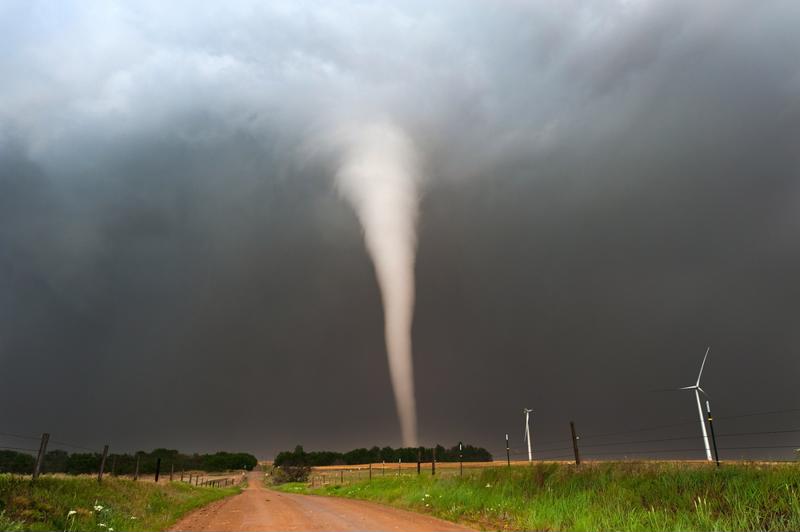As the cold weather that’s been covering the country begins to recede and give way to the warmth of the springtime, these two conflicting currents collide in many parts of the country, and thus begins Tornado season. On average, the majority of twisters spring to life between April and June, however, these natural disasters can strike at any time of the year.
With all of the complexities involved in operating a business, owners and managers need all the help they can get by having a broker there who’s not only knowledgeable about the risks associated with tornadoes, but also with how to prepare in case the unfortunate happens and a catastrophe hits.
When disaster strikes
Collectively, damages caused by tornadoes lead to an average of $1.1 billion in property losses per year, destroying businesses, residential communities and industrial structures alike, the Insurance Institute for Business & Home Safety reported. With more than 1,200 tornadoes touching down each year, according to The National Severe Storms Laboratory, that averages out to more than three twisters per day per year.
Not surprisingly then, the costs to businesses and property owners is quite high. According to the Insurance Information Institute, at 39.1 percent of all insured U.S. catastrophe losses between 1995 and 2014, tornadoes are the second costliest natural disaster, with a reported $154.9 billion in damages. Further, total insured losses from tornadoes/thunderstorms increased $10.3 billion during 2014 to hit $12.3 billion, marking the fourth costliest year on record.
Although the central portion of the U.S. has the notorious distinction of being known as Tornado Alley, twisters are a potential threat to just about any location in the country. The recent string of losses and property damage from a series of tornadoes cutting a swath across large stretches of the South tragically illustrates this point.
On Feb. 24, 2016, a severe storm system swept across the East Coast, hitting the farming town of Waverly, Virginia. According to the Richmond Times-Dispatch, the storm caused a reported 20 tornadoes and led to an estimated $1.6 million in losses, with some experts predicting the final tally will be as high as $2.5 million.
A day later, a tornado ripped through the small town of Convent, Louisiana, causing serious damage to the Sugar Hill RV Park and destroying more than 100 buildings, AccuWeather reported.
At the same time nearly two dozen tornadoes hit the area around Pensacola, Florida, and destroyed numerous structures, including 24 units in a nearby apartment complex, according to the source.
“There was a lot of energy with this system that brought the severe weather into the Gulf Coast,” explained Courtney Spamer, meteorologist at AccuWeather. “The collision of the cool air diving down into the Plains and the warm Gulf air made for a springlike system, a setup more akin to larger systems that hit in March and April.”
With tornadoes also hitting Mississippi and South Carolina, the extreme weather system striking so early in the season can be a harbinger for what’s to come once tornado season swings into full force during the spring months.
 Businesses, community associations and other organizations need to have the right insurance coverages in place to protect against any potential losses caused by a tornado.
Businesses, community associations and other organizations need to have the right insurance coverages in place to protect against any potential losses caused by a tornado.Being prepared
If you’re a broker, you’ll want to help your clients obtain the highest quality insurance coverages to ensure financial peace of mind in the event that a natural disaster like a tornado hits. Tornadoes can strike virtually any portion of the U.S., so it’s best to have an emergency plan in place.
“Tornadoes can strike virtually any portion of the U.S., so it’s best to have an emergency plan in place.”
Working with business owners and property management associations, insurance brokers and agents can assess the likelihood of a tornado striking the location. Knowing the probabilities and risks associated with operating in areas situated within a heightened tornado area is important for minimizing the exposure to risks. Next, after preparing and disseminating an emergency plan, owners and managers should work with employees, staff or residents to ensure everyone understands and is prepared for the natural-disaster response procedure.
When appropriate, it can be wise to implement tornado drills. Be sure all employees or residents know a drill will be happening before trying it. The drill should be a practice run of what it takes to make sure everyone knows the safest place in the building, whether that be the basement, or other windowless interior room such as a bathroom, hallway or closet.
Partnering with McGowan
No matter how prepared any company or management association is, tornadoes can still cause a considerable amount of destruction. Apartment complexes, trailer parks and other community associations have a higher risk exposure for these types of natural disasters and need the added protections afforded by robust CAT property insurance.
Brokers seeking out the best insurance packages for businesses that need coverage for tornadoes should consider partnering with McGowan Risk Specialists. With specially designed insurance packages that cover all other perils, such as flood, tornado, hurricane and storm damage, business owners can ensure their property, including equipment and inventory, is protected. Brokers who partner with McGowan Risk Specialists gain access to wholesale insurance products tailored to mitigate the unique risks facing businesses, community associations and other organizations.





